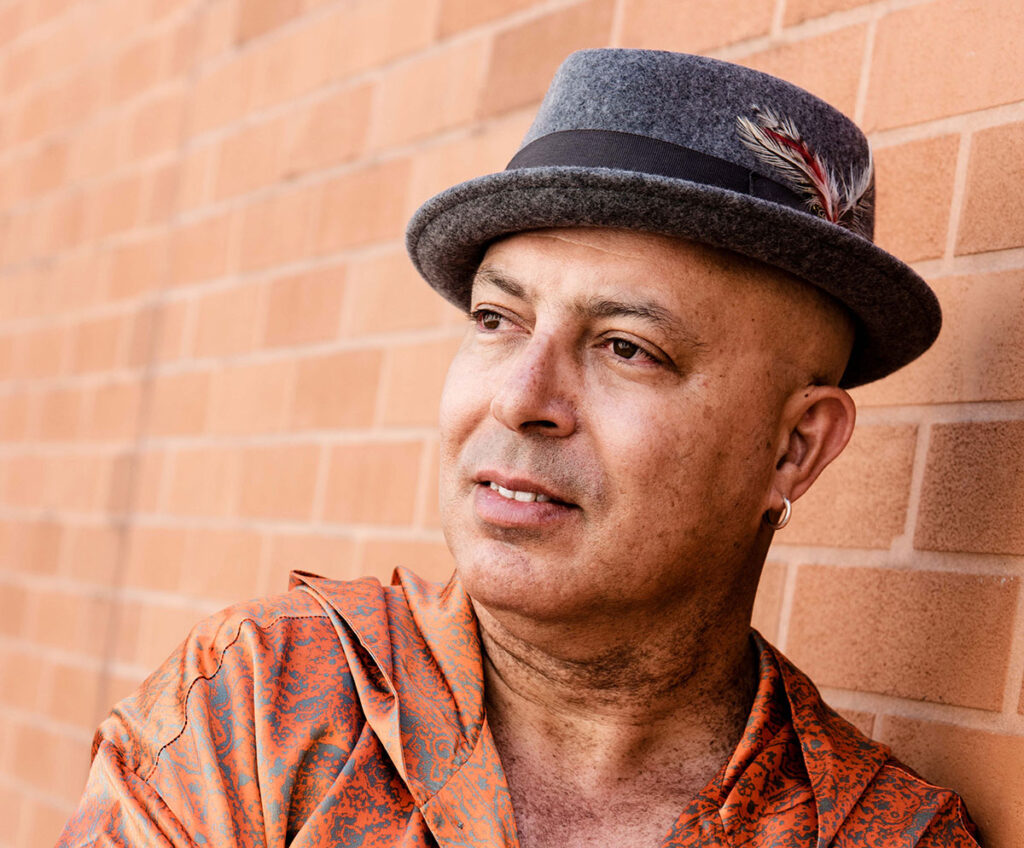
Dhafer Youssef – Photo: Sabine Hauswirth
GLOBETROTTER PAR EXCELLENCE
Dhafer Youssef lives sometimes in Tunis, sometimes in Vienna, then in Paris or in New York. The planet seems to be his home, musically anyway. Sometimes one of his records is a prostration to American jazz, and the next shows his deep connection to Indian music. Sometimes he is “Electric Sufi” and other times he spreads out the “Diwan of Beauty and Odd”. Dhafer Youssef is rooted in the Arabic music and singing tradition of his North African homeland Tunisia. He plays the Arabic short-necked lute oud, sings, composes and is an eloquent entertainer at his concert performances.
Because he could not freely indulge his experimental passion for music at home, he left Tunisia at the age of 19 and emigrated to Vienna. His exposure to Western music and jazz soon made him a sought-after fellow musician; he was able to perfect his instrumental skills and constantly listen to new music, which he absorbed like a sponge.
Dhafer’s childhood was marked by Arabic music. The way he sang, the phrasing of the music, the leading of the melody – all this shows that. It was also then that he learned to love and play the oud. He even started studying at the conservatory in Tunis, but this education was too traditional for him. Without further ado, he left his country “for the sake of music” in the direction of the culture of the Occident.
Dhafer Youssef is one of those jazz musicians from the Arab world who have managed to reconcile very divergent musical traditions. The arc spans from US-American jazz and its European forms to Turkey and traditional Indian music. Dhafer Youssef draws from all these influences and creates sensual melodies and intricate rhythmic structures of often enchanting beauty. With his driving beats, his invitations to dance and his openness to electronic sounds, he has made his music highly attractive to a young audience.
The new album: STREET OF MINARETS
Some albums come about through spontaneous impulses or during random rehearsals. Others, however, have to mature like good old wine – and let time work for them. Maturity is exactly what the new album Street of Minarets by Tunisian oud master and singer Dhafer Youssef stands for. While composing his previous album Sounds of Mirrors (2018) with a combination of his own touch and Indian music was pretty obvious for Dhafer, Street of Minarets required five years of research and a lot of hard work.
Therefore, for Dhafer’s new musical journey, let’s delve a bit into his previous career. The oud master came to music at a young age through religion. At the age of six, he sang at wedding parties in his native Tunisian village of Téboulba, 25 kilometers from Monastir. Then he discovered the oud and practiced it to perfection. At the end of the 80s, Dhafer moved to Vienna to study classical music. This period, during which he also experienced disappointment, loneliness and poverty, became a career milestone, as Dhafer got the chance to play at the famous Viennese jazz club Porgy and Bess.
Today, his long and hard work, which led to perfect technique, virtuosity and irrepressible energy, is reflected on stage. Even after a 13-year career with a total of eight albums and numerous worldwide tours, there is still a fire in Dhafer’s soul.
This trait has helped Dhafer Youssef to create his new masterpiece, with the participation of legendary musicians:
- Herbie Hancock on piano
- Marcus Miller on bass
- Nguyên Lê on guitar
- Rakesh Chaurasia on flute
- Adriano Dos Santos Tenori on percussions
- Dave Holland on double bass
- Vinnie Colaiuta on drums
- Ambrose Akinmusire on trumpet
Dhafer confesses that he wrote the album in the opposite way he normally does. First he considered who should actively participate in his record, only then – with his guests in mind – he composed the music.
Herbie Hancock was his first choice. Following his wife’s suggestion, he asked Herbie to participate in the recording session. Herbie immediately accepted the request, but on one very pleasant condition – Dhafer should also play on Herbie’s upcoming record. Like Herbie Hancock, Marcus Miller was also involved in several albums by Miles Davis, which deeply inspired Dhafer. With Hancock and Miller as solid pillars, recording began in 2017 at ‘Sunset Boulevard Studio’ in Los Angeles, California, where pure magic also prevailed through other wonderful musicians: Dave Holland, Nguyên Lê, Vinnie Colaiuta and Ambrose Akinmusire.
Of course, Dhafer Youssef could have been irritated by the presence of such icons. But whoever listens to Street of Minarets experiences the exact opposite: the oud master is inspired by their experiences and grandiose musicality and adds his own musical signature to their contributions – a bridge between East and West, or more precisely: a bridge between Indian and Arabic music and Western classical and jazz.
“The theme of the album is primarily about traveling…” explains Dhafer. “Having traveled to the far corners of the world in search of new sounds, here I sing in a completely different way, using vocal effects I grew up with. Especially the sound of a megaphone during calls to prayer – hence the album title Streets Of Minarets.” The other guests also took part in a truly magical journey. Rakesh Chaurasias’ flute and Adriano Dos Santos Tenoris’ percussion were recorded in Paris. The album mix took place at Nguyên Lê’s home studio in Lyon, France, under the supervision of Steve Argüelles, and the mastering in Gothenburg, Sweden.
“This is also a journey through time,” says Dhafer. “The bridge is equally between the child I was, a music lover and admirer of the great masters (Miles, Herbie, Dave…), and the adult individual I have become. A bridge between the jazz of the 50s and its rockier version of the 80s. I wanted to show that as a musician I’m permanently in motion, not to be labeled kitsch or exotic.”
The album opens with the atmospheric title track Street of Minarets and immediately sweeps its listeners along. ‘Bal d`âme’ (what a title!) manages a cinematographic transition, creating a dialogue between Dhafer’s oud and Herbie’s piano. This dialogue transforms into an agora with the third track ‘SharQ Suite 1: SharQ Serenade’. Marcus Miller’s bass, Vinnie Colaiuta’s drums and Ambrose Akinmusire’s trumpet make a soulful appearance and dialogue throughout the album. Don’t forget the syncopations in ‘Funky SharQ’, where Herbie’s keyboard shifts are reminiscent of The Headhunters, or the sharp bass slapping of Marcus Miller in ‘Sudra Funk’.
Who would have thought that the oud, an oriental lute with a rounded belly, could take on a funk-like dimension? Above all, who would have thought 40 years ago that Miles Davis trumpet could be combined with synthesizers and electronic drums without losing it for even a second? Courage is simply still a sign of true greatness.
(Erwan Benezet)
On Tour
No concerts at the moment. Come back soon.
Videos
A data transfer to the YouTube server takes place only after clicking on the preview image. For the processing of your data, see Privacy Policy.












